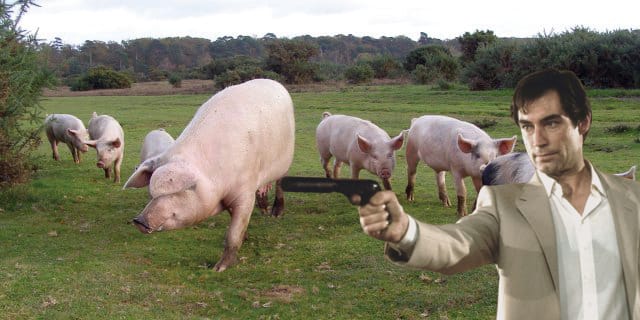Pigs – our friends and maybe our equals
Could our porcine chums be out of the frying pan?

Getting home one day, I was met with an unwelcome, albeit familiar, sight. The living room looked like a bomb had gone off and the rubble had been picked over by looters. In the kitchen, scores of mice were defending the ceramic mountain range by the sink from an amorphous and strangely sentient fungus. I dared not step into the bathroom – from what I could see, I didn’t know whether to call a professional cleaner or an exorcist. Faced with this special circle of hell, there was only conclusion I could reach: I’m living with pigs!
On reflection, this might not be quite the hyperbolic statement that it appears to be. We may be most closely related with chimps, but we share much in common with our barnyard friends.
Medically, we have much to owe the pig. Before E. coli and human DNA got drunk together at a party in 1977, most insulin came from pigs – for which diabetics of the world rejoice. And unless the law making motorcycle helmets compulsory is repealed or stem cells actually prove themselves useful for something, we can fund the deficit in organ donors with a little help from our porcine pals. Pig hearts, sow livers, bacon kidneys – these things need not sound as daft as they do.
Although, in the interests of balance, maybe we should start making human suede and human bacon? That brings me onto another point of similarity. Human meat tastes most like pork… so I have been told. In the language of the Marquesas Islands of Polynesia, the word for human translates as Long Pig. However, the semantics ties itself in knots when the word for pig translates as Short Human. The words for all other animals are a specified number of chickens in a coat. The word for chicken is some kind of vegetable, I believe.
Pigs have given us so much, from food to medicine, with so many charming phrases along the way
Religion has tended to have a dim view of pigs. They’ve always been seen as dirty, greedy, unclean animals, not quite kosher, quite haraam. I don’t want to get into any theological debates here (goodness knows Comment loves them!) but it seems to me that pigs are the scapegoat (scape-pig?) for the nature of an animal that doesn’t walk with cloven feet, but does speak with a cloven tongue and thinks with a cloven mind. Pigs have borne this misrepresentation with characteristic good humour.
Pigs have given us so much, from food to medicine, with so many charming phrases along the way. In return, we have not been so generous. Apart from the occasional lovelorn chap who marries a pig, we have consistently taken without giving back. Given our intimate relationship with our porcine cousins, this is categorically wrong. So, what can we do to redress this imbalance? Offer them some rashers of Danish bacon made with real Danes? Or at least a selection of chickens in an overcoat. Maybe we should donate our kidneys en masse as a gesture of reparation? Maybe not. I can’t speak for you, but I’m using mine at the moment.
One option that would be for the benefit of everyone would be to give pigs flying lessons. Microlights, biplanes, Boeing 747s; it doesn’t matter. We could transform the phrase, “when pigs fly” from a cynical scoff at a far-fetched idea to simply a measure of time. If pigs could fulfill their dreams, what would stop you from yours? On a practical note, they could also fill in when BA strikes again.
I’m not the only one to notice this fundamental bond between man and pig. Winston Churchill said: “Dogs look up to man. Cats look down to man. Pigs look us straight in the eye and see an equal.”








